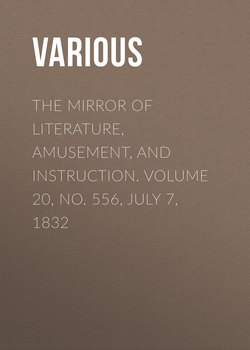Читать книгу The Mirror of Literature, Amusement, and Instruction. Volume 20, No. 556, July 7, 1832 - Various - Страница 4
SURREY ZOOLOGICAL GARDENS
KING KENULPH'S DAUGHTER
ОглавлениеThis is little better than a versified fact. The outline may be found in Sir Robert Atkyns' History of Gloucestershire, p. 435.
King Kenulph he died, as kings have died,
The will of the Lord be done;
And he left to the care of his daughter fair,
Queen Quendred, an infant son.
The daughter gazed at her brother king,
Her eye had an evil mote;
And then she played with his yellow hair,
And patted his infant throat;
And then she muster'd a bloody mind,
And whisper'd a favour'd slut,
While patting the infant monarch's throat,
It would not be much to cut.
The favour'd gipsey noted the hint,
And she thought it not amiss,
She hied to the infant's governor,
And gave him a loving kiss.
The kiss of woman's a wond'rous juice,
That poisoneth pious minds,
It worketh more than the wrath of hell,
And the eye of justice blinds.
So they cut the infant monarch's throat,
They buried him in the wood,
The Mistress Quendred liv'd as a queen,
And they thought the deed was good.
Now mark, how ill is a crime conceal'd,
Bad deeds will never accord,
The murder never beheld at home,
Was to light elsewhere restor'd,
They wash'd their hands in the monarch's blood,
And the world roll'd on the same,
Till swift to the holy shrine at Rome,
A fluttering dove there came.
A dove, a peaceful, timorous bird,
That carried a parchment scroll,
And in letters of gold, the crime it told,
That blasted a sister's soul.
That fluttering dove flew round the shrine,
Where the Pope by chance was led,
And he let the scribbled parchment fall
On his holiness' bald head.
Now the Pope was very sore perplex'd,
At the words the dove had scrawl'd,
For he could not read the pig-squeak tongue,
Which is now old English call'd.
He questioned the French ambassador,
The news of that scroll to speak.
Who bowing observed, "it was not French,
He never had learn'd the Greek."
He ask'd a monk from Byzantium,
A monk as fat as a tench,
He merely remark'd "it was not Greek,
He never had learn'd the French."
He question'd the grave Lord Cardinal,
He ordered the monks to pray'rs,
The monks ne'er knew what language it was,
When they saw it was not theirs.
But there chanced to be an Englishman,
At Rome, on a trading hope,
The tale of blood and the letters gold,
He read to the holy Pope.
'Twas how King Kenulph an infant son,
Bequeath'd to his daughter's care,
And how the daughter slaughtered the son,
It clearly mention'd where.
Then the Pope cried, "Heaven's will be done,"
And a loud Hosanna sung,
The incense fumed to the lofty dome.
Like ray-beam drapery hung.
And they canoniz'd the holy dove,
Like the soul of a martyr dead,
The deed is still in the calendar,
In capital letters red.
Now when to Britain the tidings came
Of her island's perish'd hope,
The monks took hatchets to Winchcomb Wood,
And they glorified the Pope.
And after many a night of toil,
They struck at the infant's bone,
Beneath a tree, where an awful owl
Was screeching a midnight groan.
They bore the bones by the moonlight ray,
To the convent's holy shrine,
And from the psaltry sang a psalm,
The psalm one hundred and nine.
The queen, she hearken'd the pious tones,
As they pass'd the palace by,
It seem'd the saints and the morning stars
Were chorussing in the sky.
But when she hearken'd the deed was known,
And her coming hour of strife,
And how they had found the royal bones
From which she had taken the life,
She got King David's psalter book,
And turn'd to the psalm they sung,
And began to read it contrariwise,
Though it blister'd on her tongue.
And she mock'd the monkish melody,
With a heart like boiling pitch,
And the clouds went shudd'ring as they heard
Like a broom beneath a witch.
When she had gotten to verse the twelfth,
'Twas the twelfth verse from the end,
Her breast upheav'd a horrible groan,
And she gave the psalm a rend.
The lofty turret quiver'd with fear,
The floor of the chapel shook,
Her eyeballs fell from her burning brow,
And blooded the psalter book.
And thrice she groan'd and thrice she sigh'd,
And thrice she bowed her head.
And a heavy fall and a light'ning flash
Was the knell of a sinner dead.
And forth from her eyeless sockets flew
A furious flame around,
And blood stream'd out of her spirting mouth,
Like water upon the ground.
The magpie chatter'd above the corpse,
The owl sang funeral lay,
The twisting worm pass'd over her face,
And it writhed and turn'd away.
The jackdaws caw'd at the body dead,
Expos'd on the churchyard stones,
They wagg'd their tails in scorn of her flesh,
And turn'd up their bills at her bones.
The convent mastiff trotting along,
Sniff'd hard at the mortal leaven,
Then bristled his hair at her brimstone smell,
And howl'd out his fears to heaven.
Then the jackdaw screech'd his joy,
That he spurn'd the royal feast,
And keen'd all night to the grievous owl,
And the howling mastiff beast.
Loud on that night was the thunder crash,
Sad was the voice of the wind,
Swift was the glare of the lightning flash,
And the whizz it left behind.
At morn when the pious brothers came
To give the body to ground,
The skull, the feet, and palms of her hands
Were all that they ever found.
Then the holy monks with ominous shake
Of the head, looked wond'rous sly,
While the breeze that waved their whiten'd locks,
Bore a pray'r for her soul on high.
P.S.
